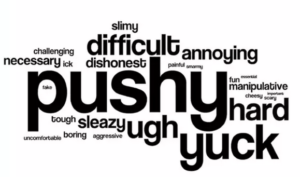I get asked this question all the time, by customers, business acquaintances, even friends and family. There’s an underlying assumption in the question that certain people are simply born salesmen and women; arriving into this world with an impeccable set of communication skills, a high EQ to match their high IQ and an unquenchable thirst to close, close, close!
When I drill down on the question, I’m often confronted with a lengthy list of doubts and fears. These ‘non-salespeople’ simply can’t understand how a salesperson can continue each day, in the face of almost insurmountable opposition, without losing their energy, enthusiasm and the will to live! The thought of having to make cold-calls, persuade, influence and cajole strangers and deal with constant rejection is enough to make the vast majority of people run for the hills.
The unfortunate reality is that sales is no longer simply a career path, it’s a life skill that we all need to develop. Whether you are an entrepreneur, a restauranteur or a teacher in a classroom, the ability to influence, engage and ultimately convince your audience to take action is a critical skill-set to master.
I have a strong sense that many people’s fear of selling and all things sales-related, stems less from a fear of the simple act of making a sale and more from their concerns about the perception of others.
- Won’t I lose credibility if I appear too ‘salesy’?
- Surely my product or service should sell itself?
- I’m happy to talk about what I do, but someone else needs to close the sale …
Negative perceptions of sales and salespeople
Let’s be honest, the sales profession has gotten a pretty bad reputation over the years and often for good reason. The mental image most of us have of salespeople is manipulative, pushy and untrustworthy. In his fascinating book To Sell Is Human, the author Daniel H Pink surveyed a large number of people to gauge their feelings about sales and salespeople in general. He posed the question:
“When you think of sales or selling, what’s the first word that comes to mind?”
Pink took the findings from this survey and created a word cloud of the 25 adjectives and interjections that people chose most frequently in response to this question. The size of each word in the cloud reflects how often it was mentioned. I’d like you to take a moment to look at this word cloud and see how it tally’s with your own gut instincts when it comes to sales and salespeople?

For those of us who’ve spent many years in the sales profession, it’s pretty hard to read words like ‘manipulative’ and ‘sleazy’ without a sense of shame and embarrassment. Although this doesn’t reflect the behaviour of the vast majority of salespeople, a small but vocal minority have managed to give the entire industry a bad name. Is it any wonder then that so many people feel uncomfortable with the thought of selling or being seen as a salesperson?
The ‘new normal’ for sales and salespeople
There’s no doubt the world of sales is evolving and that the balance of power has well and truly shifted from seller to buyer in recent years. The more interesting question to ask perhaps is what prompted this sudden shift and what impact it may have on the perception of sales and salespeople in years to come?
In the past salespeople were operating at a distinct advantage over their customers and prospects; they had all the information at their disposal: product specs, market intel or pricing charts were at their fingertips. Their customers and prospects on the other hand had to get by on snippets of information, company brochures and sales collateral, content that had often already been sanitized for public consumption. In a world where knowledge is power, salespeople of old were playing with a loaded deck.
As Pink went on to explain in his book, as this information imbalance in the sales process gradually disappeared with the advent of the internet, the balance of power shifted irrevocably from the seller to the buyer. As Pink explains, the old world of ‘caveat emptor’ or ‘buyer beware’ slowly disappeared, to be replaced by the much more interesting world that we live in today of ‘caveat venditor’ or ‘seller beware’.
What did Pink mean by this? Simply that the crooked, shonky, used-car salesman image of old will no longer fly in this brave new world of information parity. Many potential customers will do their own research and become as informed, if not more so than the salespeople they speak to. They’ll speak to previous buyers, use comparison websites, delve into the technical and product support history of your products. In reality, they’ll become so well informed that any lie, half-truth or deception a salesperson might be tempted to tell will be discovered in a heart-beat and all their credibility will instantly evaporate.
So perhaps its worth rephrasing the original question from: “How can I sell, I’m not a salesperson?” to “How can I sell in this new world of information equality, I’m not a salesperson?”
So what can you do?
It starts with trust: Instead of focusing your efforts on selling and pushing, focus on becoming trustworthy, knowledgeable, helpful and engaged in the eyes of your customer. The old sales cliché that ‘people buy from people’ still holds true, so embrace that as your mantra and aim for trusted adviser status.
Be authentic: People want to do business with those who have experienced life, maybe even picked up a few bumps and bruises along the way and come out ahead despite these challenges. Don’t be afraid to share a little of yourself and your experiences, look for areas of commonality and mutual interest. Don’t slip into ‘sales mode’ and leave your personality behind.
Be an active listener: Prepare well, ask intelligent questions, really listen to and process the answers you’re getting back. There’s an old sales truism that customers will teach you how to sell to them if you just listen. They’ll tell you what annoys and frustrates them, what issues they have experienced with past products or services and if you really pay attention, they’ll often tell you exactly what’s required to win their business.
Have the heart of a teacher: When you place your focus on educating your prospect rather than selling to them, the impact of what you say will increase exponentially and you won’t feel any of that icky ‘salesy-ness’. Your perceived credibility and authority in the eyes of your customer has a huge bearing on their likelihood to want to do business with you.
Treat them like a customer: This one might sound counter-intuitive, but as soon as they first engage with you, prospective customers are wondering what you would be like to work with. If you start treating them like a customer from the start, helping, supporting, educating and advising them, you give them an immediate sense of what it might be like to work with you and your business.
************
The sales profession can be a tough, stressful and uncompromising place to work, but it can also be a creative, fulfilling and rewarding environment in which to build a career. For those of you who believe you just can’t sell, my advice would be to dip your toe in the water, you may find it’s not as cold as you thought …



Recent Comments